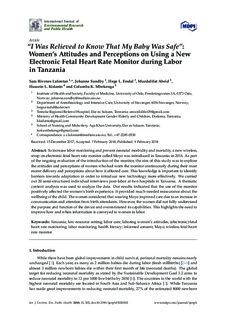| dc.contributor.author | Lafontan, Sara Rivenes | |
| dc.contributor.author | Sundby, Johanne | |
| dc.contributor.author | Ersdal, Hege Langli | |
| dc.contributor.author | Abeid, Muzdalifat | |
| dc.contributor.author | Kidanto, Hussein | |
| dc.contributor.author | Mbekenga, Columba K. | |
| dc.coverage.spatial | Tanzania | nb_NO |
| dc.date.accessioned | 2019-03-26T14:12:58Z | |
| dc.date.available | 2019-03-26T14:12:58Z | |
| dc.date.created | 2018-08-19T11:32:38Z | |
| dc.date.issued | 2018-02 | |
| dc.identifier.citation | Rivenes Lafontan, S.; Sundby, J.; Ersdal, H.L. et al. (2018) I Was Relieved to Know That My Baby Was Safe”: Women’s Attitudes and Perceptions on Using a New Electronic Fetal Heart Rate Monitor during Labor in Tanzania, International Journal of Environmental Research and Public Health. 15(2) | nb_NO |
| dc.identifier.issn | 1660-4601 | |
| dc.identifier.uri | http://hdl.handle.net/11250/2591853 | |
| dc.description.abstract | To increase labor monitoring and prevent neonatal morbidity and mortality, a new wireless, strap-on electronic fetal heart rate monitor called Moyo was introduced in Tanzania in 2016. As part of the ongoing evaluation of the introduction of the monitor, the aim of this study was to explore the attitudes and perceptions of women who had worn the monitor continuously during their most recent delivery and perceptions about how it affected care. This knowledge is important to identify barriers towards adaptation in order to introduce new technology more effectively. We carried out 20 semi-structured individual interviews post-labor at two hospitals in Tanzania. A thematic content analysis was used to analyze the data. Our results indicated that the use of the monitor positively affected the women’s birth experience. It provided much-needed reassurance about the wellbeing of the child. The women considered that wearing Moyo improved care due to an increase in communication and attention from birth attendants. However, the women did not fully understand the purpose and function of the device and overestimated its capabilities. This highlights the need to improve how and when information is conveyed to women in labor. | nb_NO |
| dc.language.iso | eng | nb_NO |
| dc.publisher | MDPI | nb_NO |
| dc.rights | Navngivelse 4.0 Internasjonal | * |
| dc.rights.uri | http://creativecommons.org/licenses/by/4.0/deed.no | * |
| dc.subject | graviditet | nb_NO |
| dc.subject | fetal heart rate monitoring | nb_NO |
| dc.subject | fødsel | nb_NO |
| dc.subject | kvinners holdninger | nb_NO |
| dc.subject | Tanzania | nb_NO |
| dc.subject | informed consent | nb_NO |
| dc.subject | health literacy | nb_NO |
| dc.subject | helseinformasjonsforståelse | nb_NO |
| dc.subject | fosterovervåkning | nb_NO |
| dc.title | "I was relieved to know that my baby was safe": women's attitudes and perceptions on using a new electronic fetal heart rate monitor during labor in Tanzania | nb_NO |
| dc.type | Journal article | nb_NO |
| dc.type | Peer reviewed | nb_NO |
| dc.description.version | acceptedVersion | nb_NO |
| dc.rights.holder | © 2018 by the authors | nb_NO |
| dc.subject.nsi | VDP::Medical disciplines: 700::Clinical medical disciplines: 750::Gynecology and obstetrics: 756 | nb_NO |
| dc.source.pagenumber | 12 | nb_NO |
| dc.source.volume | 15 | nb_NO |
| dc.source.journal | International Journal of Environmental Research and Public Health | nb_NO |
| dc.source.issue | 2 | nb_NO |
| dc.identifier.doi | 10.3390/ijerph15020302 | |
| dc.identifier.cristin | 1602951 | |
| cristin.unitcode | 217,13,2,0 | |
| cristin.unitname | Avdeling for kvalitet og helseteknologi | |
| cristin.ispublished | true | |
| cristin.fulltext | postprint | |
| cristin.qualitycode | 1 | |

